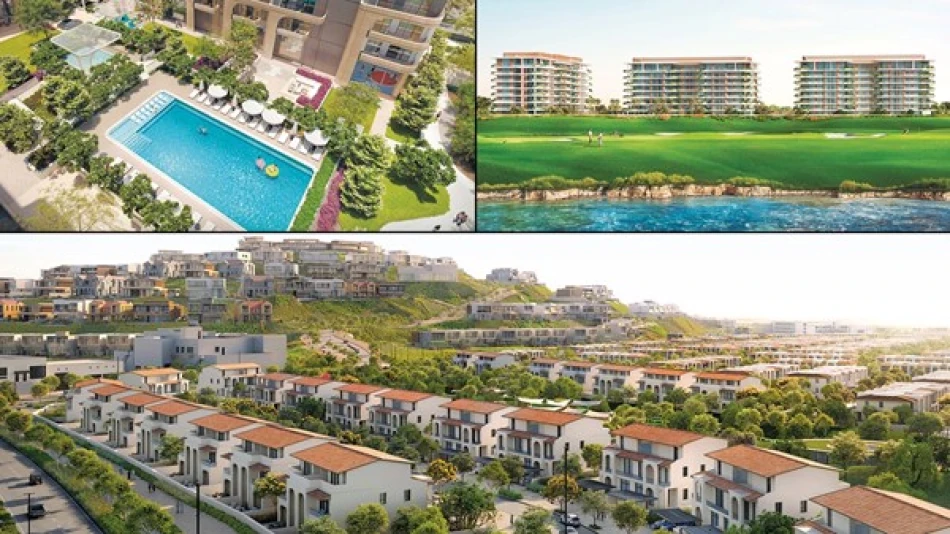
Abu Dhabi Unveils 24 Exciting New Real Estate Projects in Just 6 Months
Abu Dhabi's Real Estate Boom Signals UAE's Growing Dominance in Global Property Investment
Abu Dhabi's property sector is experiencing unprecedented momentum, with developers launching 24 new projects in the first half of 2024 alone, delivering over 4,300 residential units across premium locations. This surge reflects the emirate's strategic positioning as a global investment hub, driven by regulatory stability, foreign investor confidence, and diversified project offerings that rival Singapore and Dubai's property markets.
Market Expansion Accelerates Across Strategic Locations
The Abu Dhabi Real Estate Center's data reveals a compelling growth trajectory, with residential units increasing from 55,400 in 2022 to 60,900 in 2024—a compound annual growth rate of 4.87%. This expansion spans key developments in Al Hudayriyat, Saadiyat Island, Yas Island, and Masdar City, offering everything from luxury villas to townhouses and residential plots.
The "Dari" platform, operated by Abu Dhabi's Department of Municipalities and Transport, registered 22 projects providing approximately 4,300 apartments and villas, plus two land plot developments. This diversification strategy mirrors successful models in Singapore's integrated developments and Dubai's master-planned communities.
Premium Island Developments Lead the Charge
Al Hudayriyat Island dominates new launches with six projects delivering 833 units, including major developments like "Nayif Park Views" (184 units) and "Nayif West B" (334 villas). Yas Island follows with four projects totaling 1,098 units, featuring high-profile developments such as "Selina B" by Century 7 Properties (507 units) and "Waldorf Astoria Residences," which sold out immediately upon launch for AED 850 million.
Saadiyat Island, Abu Dhabi's cultural district, added three projects with 783 units, while Masdar City—the emirate's sustainable urban development—registered three projects providing 626 new units through Reportville Development.
Foreign Investment Surge Drives Market Confidence
International capital continues flowing into Abu Dhabi's property sector, with foreign investors from 68 nationalities completing 384 transactions worth AED 1.582 billion in Q1 2024 alone. This foreign direct investment pattern resembles the early stages of Dubai's property boom in the 2000s, but with more sophisticated regulatory frameworks and sustainable development practices.
Saadiyat Island topped transaction values at AED 5.6 billion, followed by Yas Island at AED 3.6 billion, and Mohammed bin Zayed City at AED 2.1 billion during the first quarter. These figures indicate strong liquidity and investor confidence in Abu Dhabi's long-term growth prospects.
Developer Strategies Reflect Market Maturity
Aldar Properties, Abu Dhabi's flagship developer, exemplifies the market's sophistication with its recent unveiling of Fahid Island—a AED 40 billion waterfront destination spanning 2.7 million square meters with 11 kilometers of coastline. The project's initial phases generated AED 3.5 billion in sales, demonstrating strong appetite for large-scale integrated developments.
The immediate sellout of premium projects like "Waldorf Astoria Residences" and "Manarat Living III" (sold within 24 hours) indicates supply-demand imbalances that typically precede significant price appreciation cycles, similar to patterns observed in Singapore's prime districts during growth phases.
Investment Implications and Market Outlook
Abu Dhabi's property surge reflects broader UAE economic diversification beyond oil dependency, positioning real estate as a strategic sector for wealth preservation and capital appreciation. The emirate's regulatory stability, combined with residency visa programs for property investors, creates compelling advantages over traditional safe-haven markets.
For investors, the current cycle presents opportunities reminiscent of Dubai's early 2000s expansion, but with more mature infrastructure, established governance frameworks, and sustainable development mandates. The diversity of projects—from affordable housing in Al Shamkha to ultra-luxury waterfront developments—suggests a market capable of sustained growth across multiple price segments.
The 4.87% compound annual growth rate in residential units, coupled with strong foreign investment flows, indicates Abu Dhabi is successfully positioning itself as the UAE's premium residential destination, complementing Dubai's commercial real estate dominance and creating a balanced regional property ecosystem that could attract significantly more international capital in coming years.
Most Viewed News

 Layla Al Mansoori
Layla Al Mansoori






